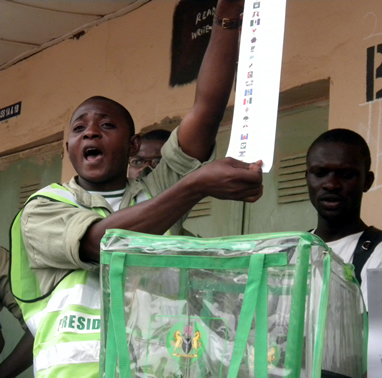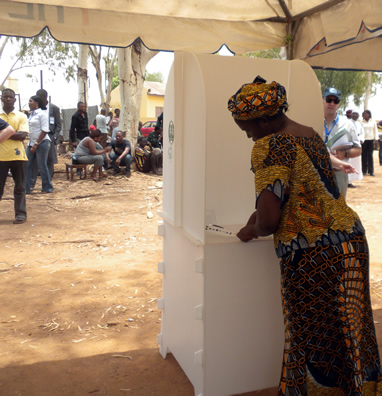|
Nigerian Elections Hold the Promise of Setting New Integrity Standard, NDI Mission Finds

Election official with National Assembly ballot at Lugbe polling station outside Abuja.
Nigeria's recent presidential and National Assembly elections "represent a step forward from seriously flawed elections of the past" and "hold the promise of setting a new standard for integrity in Nigeria's electoral process," NDI said in a preliminary statement after the presidential poll.
The Institute fielded international observer delegations for both the April 9 National Assembly elections
and the April 16 presidential poll. The first observation mission was co-led by Joe Clark, former Canadian prime minister; Mahame Ousmane, former president of Niger; Antonio Manuel Mascarenhas Monteiro, former president of Cape Verde;
Jon S. Corzine, former U.S. senator and governor of New Jersey;
Marietje Schaake, member of the European Parliament from the Netherlands; Natasha Stott Despoja, former senator from Australia; and Kenneth Wollack, president of NDI. Clark and Ousmane stayed on as co-leaders of the presidential observation mission and were joined by Robin Carnahan, secretary of state of Missouri; and Christopher Fomunyoh, NDI senior associate and regional director for Central and West Africa.
The delegations found that, despite problems, the elections gave Nigerians a real chance to vote, and they commended the millions of Nigerians who braved long lines and hot weather to participate.
| |
 A voter marks her presidential ballot in Abuja.
|
NDI also partnered with a coalition of four Nigerian civil society organizations in Project 2011 Swift Count, which fielded more than 8,000 observers to conduct a parallel vote tabulation (PVT) for the presidential and gubernatorial elections, held on April 26. A PVT is a sophisticated election observation tool used to assess the integrity of the vote and count, and verify official vote totals. Observers relayed their findings by SMS messages, which were then compiled and analyzed at Project Swift Count's headquarters in Abuja.
Project Swift Count issued an interim statement
after the presidential poll confirming the results announced by Nigeria's Independent National Electoral Commission. With the northern part of the country protesting the re-election victory of President Goodluck Jonathan, Project Swift Count
called upon all candidates and their supporters to "respect the will of the Nigerian people and to accept the results in good faith." They also asked that all political leaders "immediately and clearly make statements denouncing all acts of post-election violence."
NDI also partnered with the National Elections Incidents Center (NEIC), a coalition of three civil society groups doing citizen observation of the presidential election. The NEIC catalogued and mapped incidents and irregularities in the voting on election day. The center concluded that "the accreditation and voting process was smooth and peaceful" at the polling stations they observed.
NDI's mission in Nigeria builds on a pre-election assessment
conducted by the Institute in October. NDI has been working in Nigeria since 1999 and has fielded international observation missions to previous elections there in 1999,
2003
and 2007.
|
|
NDI Commemorates International Day of Roma with Film Featuring Music by Academy Award Winner Hans Zimmer
NDI celebrated the culture and achievements of the 10 million Roma, commonly called Gypsies, with a short public awareness film released on International Day of the Roma. The film, Who are the Roma?, is scored with original music by Hans Zimmer. Read more»
Watch the film»
Read more about NDI's work with the Roma»
'Future Women Mayors' Academy Kicks Off in Mexico
The Academy for Future Women Mayors kicked off last month in the Mexican state of Michoacán to combat the low rate of women seeking and winning office at the municipal level across the country. The academy helps provide women activists with the motivation, skills and networks to position themselves to win mayoral races. Read more»
In Guinea, Political Parties Strive to Improve its Next Elections
In Guinea, more than 40 political parties agreed to a set of principles aimed at making upcoming legislative elections — only the second competitive elections in the nation's history — less violent, more inclusive, more efficient and ultimately more democratic. Read more»
Albanian Women Finish Political Leadership School with Chance to Test New Skills in May Elections
Local elections on May 8 in Albania are an opportunity to put more women in public office in a country with one of the lowest percentages of elected women in Europe. That was the message delivered by Jozefina Topalli, Albania's speaker of parliament, to women who had just completed a 10-month program on campaign management, messaging and advocacy organized by NDI. Read more»
Contribute Now to Help Build Democratic Societies
When you contribute to NDI, our board of directors will generously match your gift dollar-for-dollar, up to $1 million. Contribute»
|
|
NDI Staff Member Seeks to Bring Women into Elections, Politics in Liberia
Mardia Greaves-Bloh visited the U.S. from Liberia for three months as NDI's latest Andi Parhamovich fellow. While in Washington, D.C., Bloh researched how civil society groups build coalitions and how to ensure that women's needs are considered and accomodated throughout the election process. She will use what she learned back in Liberia for presidential and legislative elections this year. Read more»
Read more about NDI's 2011 Liberian elections program»
Assessing Public Attitudes in Tunisia, Georgia, Burundi
NDI recently conducted focus group research in Tunisia with young people, the demographic that led the revolutionary movement that overthrew President Zine El Abidine Ben Ali in January. The research finds that young people are concerned about being sidelined in the transition process and have a lingering distrust of political parties. NDI is sharing these findings with Tunisian leaders in the transitional government, political parties and civil society to develop policies that are responsive to and inclusive of youth. Read more»
A recent poll conducted for NDI shows that economic and social issues are the major sources of concern for Georgians. Unemployment tops the list of those concerns, followed by rising prices. Respondents also felt that politicians were not doing enough to fix these problems. Read more»
Focus groups in Burundi, a country historically fraught with ethnic conflict between Hutus and Tutsis, show that citizens today are focused less on ethnic differences than on their regional, political and economic differences. They also continue to embrace the democratic process, despite politically motivated violence and an opposition party boycott of the 2010 elections. Read more»
Our Perspectives: Debates, Yemen, the Roma and Haiti
Don't miss these pieces by NDI staff:
Matt Dippell, debates program advisor, explains how a free press contributes to a culture of debate. Read more»
Les Campbell, director of Middle East and North Africa programs, talks to NPR's Morning Edition about the future for Yemen's President Saleh. Listen»
Catherine Messina Pajic, deputy director of Central and Eastern Europe programs, describes the plight of the Roma and ways you can help. Read more»
Jim Swigert, director of Latin American and Carribbean programs, looks at the challenges facing Haiti's new president in this speech he delivered at the U.S. Institute for Peace. Read more»
|